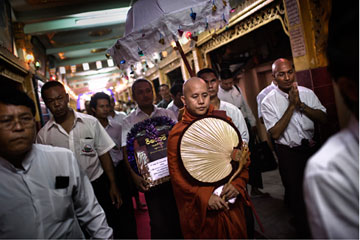
U Wirathu, the spiritual leader of the 969 Buddhist Nationalist movement, and his entourage leave after giving a sermon, at a monastery in Mandalay, Myanmar (Burma) on May 22, 2013. U Wirathu is an abbot in the New Maesoeyin Monastery where he leads about 60 monks and has influence over more than 2,500 residing there. He travels the country giving sermons to religious and laypeople encouraging Buddhists to shun Muslim business and communities.
(3 of 3)
Hard-line monks, like those in the BBS, have turned on minority Muslims and Christians, especially since the 26-year war against the largely Hindu Liberation Tigers of Tamil Eelam insurgency ended four years ago. After President Mahinda Rajapaksa, a conservative, was elected in 2005, Buddhist supremacist groups became more powerful. In recent months, their campaign of intimidation has included attacks on a Muslim-owned clothing store, a Christian pastor's house and a Muslim-linked slaughterhouse. Despite monks' being captured on video leading some of the marauding, none have been charged. Indeed, temple and state are growing ever closer in Sri Lanka, with a monk-dominated party serving as a coalition member of the government. In March, the guest of honor at the opening ceremony for the BBS-founded Buddhist Leadership Academy was Sri Lanka's Defense Secretary Gotabhaya Rajapaksa, the President's brother, who said, "It is the monks who protect our country, religion and race."
Alms in Arms
In Thailand's deep south, it's the monks who need help — and in their desperation some have resorted to methods contrary to Buddhism's pacifist dogma. The southern provinces of Pattani, Yala and Narathiwat used to be part of a Malay sultanate before staunchly Buddhist Thailand annexed the region early last century. Muslims make up at least 80% of the area's population. Since a separatist insurgency intensified in 2004, many Buddhists have been targeted because their positions — such as teachers, soldiers or government workers — are linked to the Thai state. Dozens of monks have been attacked too. Now the Thai military and other security forces have moved into the wat, as Thai Buddhist temples are known, and soldiers go out each morning with monks as they collect alms. "There's no other choice," says Lieutenant Sawai Kongsit. "We cannot separate Buddhism from guns anymore."
Wat Lak Muang, in the town of Pattani, is home to 10 Buddhist monks and around 100 soldiers. The sprawling compound's main stupa has been taken over as an operational command center for the Thai army's 23rd battalion, with camouflage netting wrapped around the central base of the holy structure. Each year, thousands of Buddhist volunteers receive training at this wat to join armed civilian militias charged with guarding their villages. Prapaladsuthipong Purassaro, who was a monk for 16 years and now tends the temple, admits that when he wore monastic robes, he owned three pistols. "Maybe I felt a little bit guilty as a Buddhist," he says. "But we have to protect ourselves."
If Buddhists feel more protected by the presence of soldiers in their temples, it sends quite another signal to the Muslim population. "By inviting soldiers into the wat, the state is wedding religion to the military," says Michael Jerryson, an assistant professor of religious studies at Youngstown State University in Ohio and author of a book about Buddhism's role in the southern Thailand conflict. "Buddhists will never think we're Thai people," says Sumoh Makeh, the mother of a suspected insurgent who, with 15 others, was killed by Thai marines in February after they tried to raid a naval base. "This is our land but we are the outsiders." After all, Muslims too are running scared in the deep south. More of them have perished in the violence than Buddhists, felled by indiscriminate bombings or whispers that they were somehow connected to the state. (By proportion of population, however, more Buddhists have died.) Yet monk after monk tells me that Muslims are using mosques to store weapons, or that every imam carries a gun. "Islam is a religion of violence," says Phratong Jiratamo, a marine turned monk. "Everyone knows this."
It's a sentiment the Burmese bin Laden would endorse. I wonder how Wirathu reconciles the peaceful sutras of his faith with the anti-Muslim violence spreading across his Bamar-majority homeland. "In Buddhism, we are not allowed to go on the offensive," he tells me. "But we have every right to defend our community." Later, as he preaches to an evening crowd, I listen to him compel smiling housewives, students, teachers, grandmothers and others to repeat after him: "I will sacrifice myself for the Bamar race."
The Buddhist spirit of forgiveness, though, still exists in the unlikeliest of places. In 2011, Watcharapong Suttha, a monk at Wat Lak Muang, was doing his morning alms, guarded by soldiers, when a bomb detonated. The lower half of his body is covered in shrapnel scars. Now 29 and disrobed, Watcharapong is still traumatized, his eyes darting, his body beset by twitches. But he does not blame an entire faith for his attack. "Islam is a peaceful religion, like Buddhism, like all religions," he says. "If we blame Muslims, they will blame us. Then this violence will never end."
